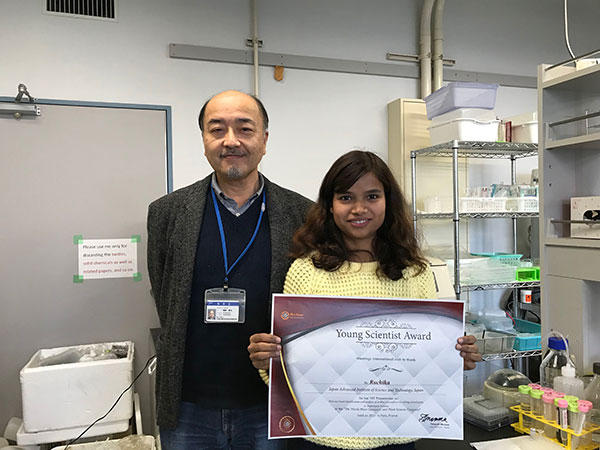Ms. Ruchika received the Young Scientist Award in Plant Genomics 2021
Ms. Ruchika (3rd-year doctoral student in Tsukahara Lab of Bioscience and Biotechnology Area) received the Young Scientist Award in the 5th World Plant Genomics and Plant Science Congress (Plant Genomics 2021).
Plant Genomics 2021 is an international conference on the theme of "Surpassing the Vision in Plant Genomics and Plant Science", which was held in Paris, France during September 27-28, 2021.
Plant Genomics Congress is the premier event that brings together a unique and international mix of experts, researchers, and decision-makers both from academia and industry across the globe to exchange their knowledge, expertise, and research innovations to build a world-class plant genomics conference.
■Date Awarded
September 27, 2021
■Title
RNA-Seq-based identification and analysis of uridine-to-cytidine RNA editing related genes in Arabidopsis thaliana
■Authors
Ruchika, Toshifumi Tsukahara
■Abstract
Cytosine-to-Uridine (C-to-U) and adenine-to-inosine (A-to-I) RNA editing involves the deamination phenomenon, which is common in animals and plants; however, the amination of U-to-C is confined to the plants. In this study, the high-throughput RNA sequencing (RNA-seq) of 12-days-old Arabidopsis seedlings was performed, which enables transcriptome-wide identification of RNA editing sites to analyses differentially expressed genes (DEGs) and nucleotide base conversions. The results showed that DEGs were expressed to higher levels in 12-days-old seedlings than in 20-days-old seedlings. This was confirmed by higher higher. Fragment Per Kilobase of transcript per Million mapped reads (FPKM) values, read counts, and more up-regulated genes, in 12-days-old seedlings. Additionally, pentatricopeptide repeat (PPR) genes were also expressed at higher levels as indicated by the log2FC values. The U-to-C RNA editing are predominantly found in the untranslated region (UTR) region of the mature mRNA and affect its secondary structure. Our results suggest that U-to-C RNA editing in mature transcripts impacts plant physiology. Furthermore, we investigated the physiological role of U-to-C RNA editing in Arabidopsis by using the transcription inhibitor, Actinomycin D (ActD). Addition of ActD to the cell suspension culture of transgenic Arabidopsis generated by Agrobacterium-mediated transformation revealed that single nucleotide conversion adversely affects the secondary structure and mRNA half-life of PPR protein.
■Comment
It is my great honour to receive the Young Scientist Award at Plant Genomics 2021. First of all I would like to make a special mention of my supervisor Professor Toshifumi Tsukahara, for his constant support and believe on me throughout my doctoral study in Japan. I would like to thank him, who saw the capabilities in me and nurtured my passion for doing a quality research. His discussions have always added the value to my research. Special cheers to all the Tsukahara lab members, this award is definitely an effort by all of us together and will be shared equally among all of us. At the same, I would also like to take this opportunity to thank the judging committee at the conference who selected me as the candidate for this award. Finally, I would like to thanks my parents and family members for always encouraging me to continue the hard work and morally supporting throughout my good and bad times.
October 25, 2021
